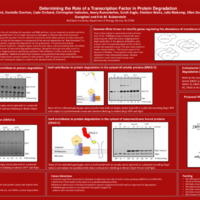Browse Exhibits (1 total)
Samantha Turk | Determining the Role of a Transcription Factor in Protein Degradation

Proteins are essential to life. They perform a variety of functions within the cell, including cell regulation and DNA synthesis. Just as important as protein synthesis is the antiparallel process of protein degradation. A protein must be degraded when it is no longer necessary, is damaged, or behaves aberrantly to prevent organismal harm. Proteins can behave aberrantly by persistently engaging with a protein channel called the translocon, which allows proteins to move across the membrane of the endoplasmic reticulum. In humans, a protein known to clog the translocons is a component of low-density lipoproteins (or “bad cholesterol”). A ubiquitin ligase in yeast known as Hrd1 polyubiquitylates the aberrant protein, tagging it for degradation via the proteasome. The proteasome detects polyubiquitination and degrades tagged proteins, recycling them into shorter fragments. Ubiquitin ligases rarely function alone, and yeast lacking Hrd1 still exhibit residual degradation of translocon-clogging proteins, suggesting the existence of alternative degradation pathways. We performed a genome-wide screen to identify genes that may play a role in protein degradation of translocon-clogging proteins, identifying a potential 150 candidates. Further small-scale reporter assays were performed, confirming the role for 42 genes in protein degradation. Additional biochemical validation using cycloheximide chase showed the requirement of 3 genes, one of which is part of a heterodimeric transcription factor complex involved in lipid synthesis. With the process of protein degradation being conserved in both yeast and humans, validated genes may represent therapeutic targets for patients with elevated levels of cholesterol.
Faculty Mentor: Dr. Eric "VJ" Rubenstein
Department of Biology
Graduate
